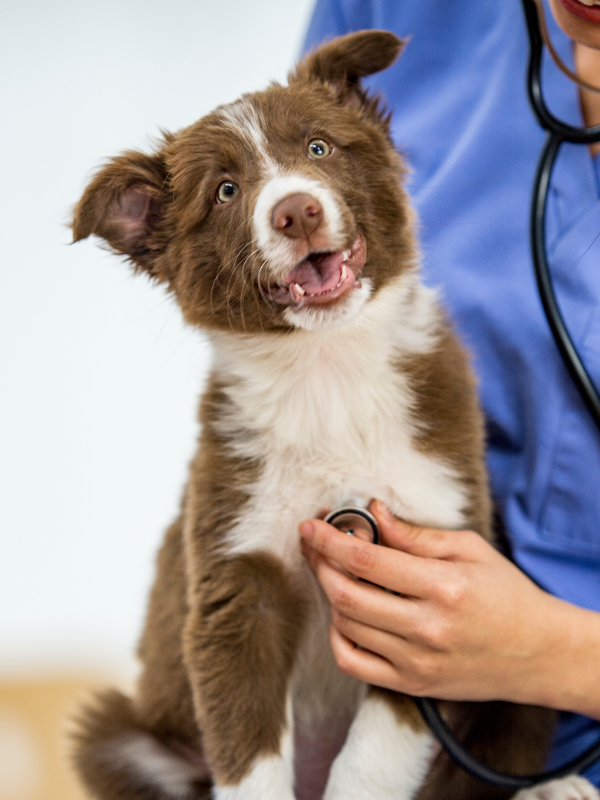Small Animal
Wellness and Preventative Care
At Potlatch Veterinary Clinic, we believe that the best way to provide your pet with a healthy and happy life is to address their overall well-being with proactive wellness and preventative care.
Comprehensive Preventative Care for Your Pet’s Long-Term Health
Proactively managing your pet’s health is key to ensuring a long and happy life. At Potlatch Veterinary Clinic, we prioritize preventative care by equipping pet owners with the education, tools, and resources needed to avoid many common health issues before they start.
A comprehensive wellness exam by one of our experienced veterinarians will provide valuable insights into your pet’s overall health. During the exam, we’ll discuss essential topics such as nutrition, dental care, parasite prevention, and vaccinations. Our team is here to help you make informed, healthy choices for your pet’s specific needs.
For a deeper understanding of your pet’s health, we also offer advanced diagnostics, including in-house blood work and urinalysis, to assess organ function and identify potential concerns early on.
Take a proactive approach to your pet’s wellbeing contact Potlatch Veterinary Clinic today to schedule an appointment!
Vaccinations
At Potlatch Veterinary Clinic, we’re committed to educating pet owners about the best vaccines for their pet’s unique lifestyle. Whether you have a dog or cat, we offer high-quality, Elanco Ultra core vaccines specifically designed for each species. These vaccines are formulated with highly purified, ½ ml doses half the volume of standard vaccines helping to reduce discomfort and minimize unnecessary proteins and debris.
Our vaccine recommendations are tailored to protect pets from the diseases most common in our region. For dogs, we suggest the Distemper, Adenovirus, and Parvovirus (DAP) combo vaccine, which provides protection for 1 to 3 years depending on your dog’s vaccination history. Additionally, the DAP vaccine can be administered with or without the Leptospirosis vaccine, which we may recommend based on your dog’s lifestyle. For social dogs visiting parks or boarding facilities, we also offer the Bordetella vaccine for added protection.
For cats, we use the FVRCP combo vaccine to safeguard against Feline Herpesvirus, Calicivirus, and Panleukopenia, providing protection for up to 3 years. The FVRCP vaccine can be combined with the Feline Leukemia Virus vaccine, depending on your cat’s lifestyle and risk factors.
Rabies vaccination is always recommended for both dogs and cats and protects for 1 to 3 years based on vaccine history. Many city ordinances, kennels, groomers, and veterinary clinics require rabies vaccination. At Potlatch Veterinary Clinic, we use a Thimerosal-Free Rabies vaccine to ensure the highest level of protection for your pet and family.
Contact us today to schedule an appointment and keep your pet up-to-date on their vaccines!
Microchipping
What is a Microchip?
A microchip is a small (about the size of a grain of rice), electronic chip that is placed under the skin of an animal that can be activated by a handheld scanner to transmit a unique identification number to the scanner. This unique identifier can then be used to look up the animal’s name and any information that the owner wishes to provide, such as their name and contact information in the event that their animal is found and scanned.
Why should I consider microchipping my pet?
The number one reason to microchip your pet is to improve the chance of reuniting you with your pet if it becomes lost or stolen. When animals are found and taken to shelters or veterinary clinics, the first thing that is done in the event that identification tags are unreadable, lost or not found is to scan the animal for a microchip. They can also be used to prove ownership in an effort to recover a stolen animal.
Microchipping is considered a form of permanent identification that can be used for registering animals with breed associations and organizations like the AKC (American Kennel Club) and OFA (Orthopedic Foundation for Animals).
What sort of information is stored on the microchip? Do I need to worry about my private information?
The only information that is stored directly on the chip is the unique identifier. This number can then be used to look up the animal on the microchip registration database. Each microchip manufacturer’s database is different in what additional information can be stored. At Potlatch Veterinary Clinic, we use Datamars 15 digit microchips. This manufacturer uses a database (www.petlink.net) that allows the owner to very specifically choose what information they wish to provide, about themselves and/or their pet.
What is a Microchip NOT?
A microchip is not a GPS locator, nor a replacement for a current Rabies tag. It is a permanent form of identification that keeps your contact information linked to your pet at all times.
How is a Microchip implanted? Does it hurt?
The microchip is placed under the skin by injection with a hypodermic needle. Although the needle is slightly larger, it typically is no more painful than those used for your pet’s vaccinations and can be done at any time, either during a routine visit or while they are under anesthesia for another procedure, such as neutering or spaying.
Does it cost more money to register the microchip?
No, the registration cost is included in the microchipping fee.

